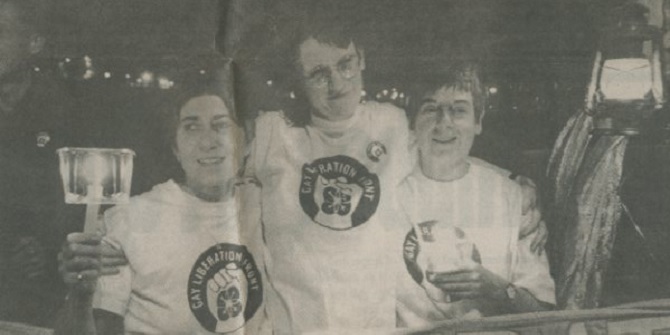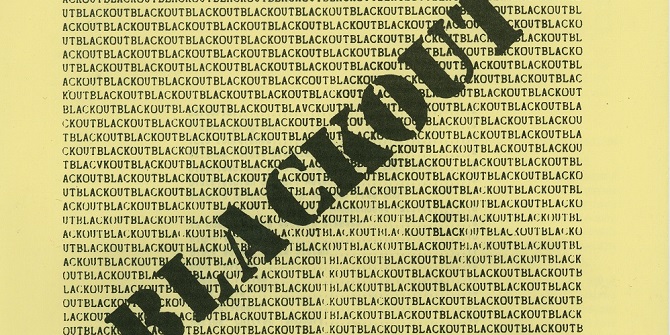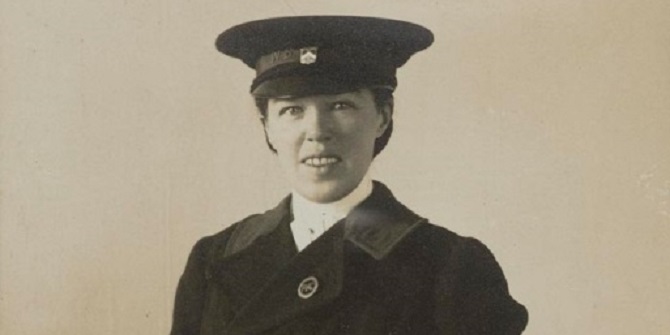The Campaign for Homosexual Equality (CHE) held its first national conference 50 years ago in April 1973, on the pier in the seaside resort of Morecambe, Lancashire. CHE was the leading and most influential gay rights organisation in Britain in the late twentieth century, writes Dr Clifford Williams. Its extensive archive is held at LSE as part of the Hall Carpenter Archive (HCA) collection.
Gay News which was the main reporting publication for people who today might identify as lesbian, gay or bisexual, was published between 1972 and 1983. It is a major source of information and stories about that period. It reported the 1973 CHE Conference to have been “a total success”. The number of people attending was estimated to be between 230 and 400. That is slightly more than the estimate for the numbers who attended the first Gay Pride in London the previous year (although the figure for that is often incorrectly given as 2,000).
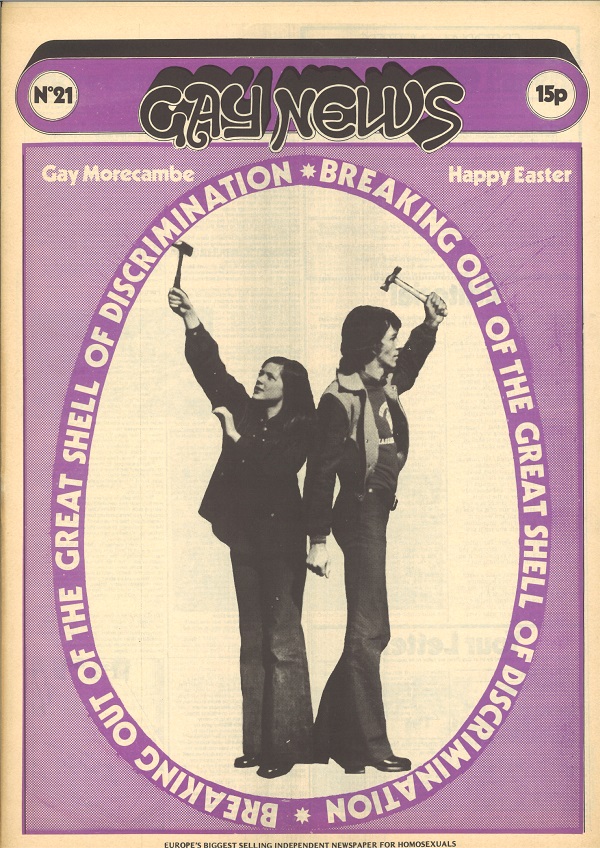
CHE existed both as an organisation enabling mostly gay men to meet other gay men throughout numerous local branches, and as a campaigning pressure group. The Morecambe conference forged CHE’s identity as a truly national and influential group.
Papers from various CHE conferences are held at LSE (mainly in HCA/CHE 8 and HCA/CHE2/8 series). Correspondence from 1972 shows that CHE tried to get the town of Scarborough to accept a booking for its first conference. Scarborough refused to accept a booking from a homosexual organisation. Morecambe was happy to accept the business and Gay News reported on the pleasant reception they found in the seaside resort.
1974 saw Malvern host the conference and then in 1975 Sheffield. A few delegate papers are in the archive along with an unidentified photo of a young man taken at the event in Sheffield. Attempts by the author to put a name to the photograph have proved unsuccessful – can you help?
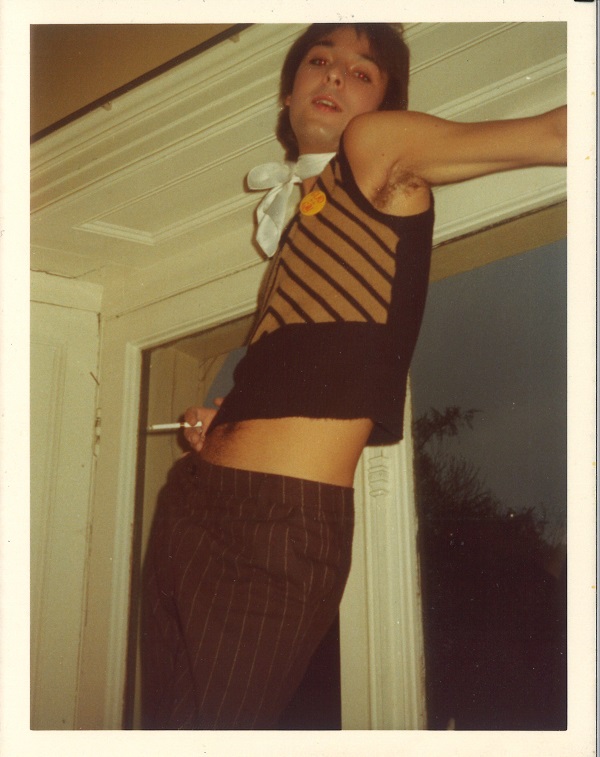
In 1976 CHE found a warm civic welcome in Southampton. By this time the wheels of conference running were well-oiled and CHE even charted a train from London Waterloo station to Southampton and back for delegates. Tickets for the train were £5 and amazingly the LSE archive has one of those tickets! Railway ticket collectors may be missing that one from their collections. Surviving tickets will be rare. The ticket is a star item in the HCA.
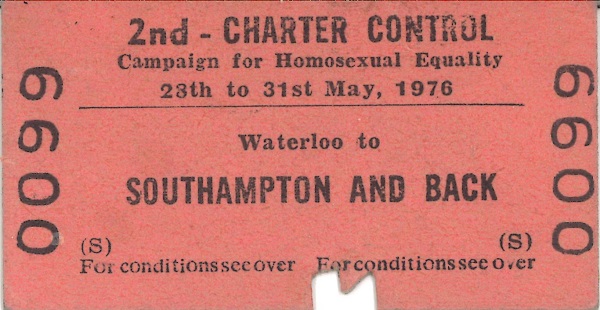
The Southampton CHE conference even had its own newspaper – The Daily Gay, a glossy large broadsheet filled with news of the conference and what was happening in Southampton. There were four editions covering 28 May to 31 May 1976 (HCA/CHE8/29). Not everyone welcomed the gay conference in Southampton. Some held demonstrations against the event.
In 1977 CHE chose Nottingham as their venue and LSE has a plastic carrier bag from that event (CHE8/29).
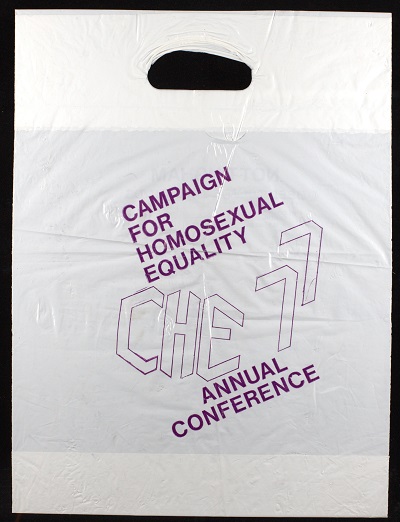
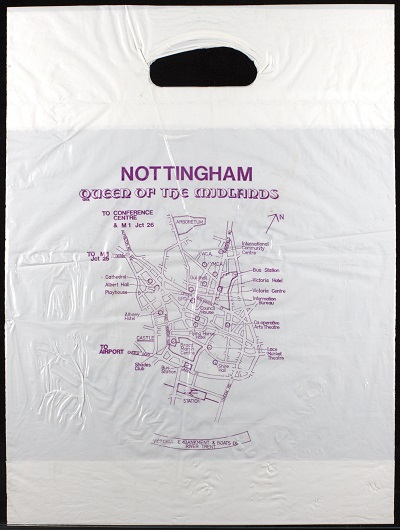
In 1981 the conference was held as part of a GayFest in Durham. CHE used professional conference organisers. CHE suffered a big financial loss and were not happy with the company they employed to run the event (see Gay News issue 255 December 1983). 1982 saw GayFest held in Sheffield. That also made a loss but not nearly as much as 1981. CHE conferences were scaled down by the 1990s and became one day events.
Today a CHE Research Trust exists to help preserve the history of CHE. CHERT was registered as a charity in March 2022.
CHE archives cover their campaigns for law reform, for example to lower the age of consent (which was not equal to heterosexual acts until 2001). There is also a considerable amount of material covering the monitoring of police activity. CHE held meetings with senior police officers concerning police tactics used in policing public areas such as toilets used by men to meet other men for sex. Cambridge CHE for example were very proactive on that issue (see HCA/CHE7/30 which includes a report on Cottaging and the police by Oliver Merrington (1978)). HCA/CHE/7/33 has detailed papers and correspondence relating to a case of gross indecency in Norfolk in 1982 and the manner in which it was reported in the Eastern Evening News (who printed the full address of the man convicted).
CHE archives were used heavily by Peter Scott-Presland in writing his book Amiable Warriors (A history of the CHE and its times) vol 1 A Space to breathe (Paradise Press 2015). I also spent a considerable number of hours examining CHE documents in the LSE archives for my history of the early gay and lesbian youth groups, published as Courage to Be (The Book Guild 2021).
While in recent years the Gay Liberation Front, which had their first meeting in the UK at LSE in 1970, has received much publicity and is more well known to younger students of LGBT/ Queer history, CHE was a longer lasting and more effective campaigning organisation, with a far greater number of members. Thanks to the records kept at LSE its contribution and impact can be researched, evaluated and celebrated.



